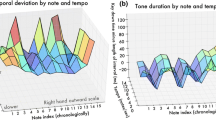Abstract
Musicians undergo extensive training which enhances established neural links between auditory and motor areas of the brain. Long-term training develops, strengthens and enables flexibility in these connections allowing proficiency in performance. Previous research has indicated that passive listening of trained music results in the recruitment of premotor areas. It has been argued that this sound–action representation may rely on activity in mirror neuron systems and that these systems are heavily dependent on actual sensorimotor experience. Action observation studies using electroencephalography have associated changes in mu rhythm activity with the mirror neuron system in the visuomotor domain. We aimed to investigate similar effects in the audiomotor domain. We utilised a mu suppression method in our action-listening study to detect involuntary motor coactivation when pianists passively listened to piano melodies. Wavelet analysis revealed sensorimotor mu rhythm suppression while pianists listened passively to piano melodies. Thus, we show that this spectral analysis method can also be used to demonstrate that auditory stimuli can activate the human mirror neuron system when sounds are linked to actions. Mu suppression could be a useful index for further research on action representation and training-induced plasticity.



Similar content being viewed by others
References
Avikainen S, Forss N, Hari R (2002) Modulated activation of the human SI and SII cortices during observation of hand actions. NeuroImage 15:640–646. doi:10.1006/nimg.2001.1029
Bangert M, Peschel T, Schlaugh G et al (2006) Shared networks for auditory and motor processing in professional pianists: evidence from fMRI conjunction. NeuroImage 30:917–926. doi:10.1016/j.neuroimage.2005.10.04
Baumann S, Koeneke S, Schmidt CF et al (2007) A network for audio–motor coordination in skilled pianists and non-musicians. Brain Res 1161:65–78. doi:10.1016/j.brainres.2007.05.045
Behmer LP Jr, Jantzen KJ (2011) Reading sheet music facilitates sensorimotor mu-desynchronization in musicians. Clin Neurophysiol 122:1342–1347. doi:10.1016/j.clinph.2010.12.035
Caspers S, Zilles K, Laird AR, Eickhoff SB (2010) ALE meta-analysis of action observation and imitation in the human brain. NeuroImage 50:1148–1167. doi:10.1016/j.neuroimage.2009.12.112
Catmur C, Walsh V, Heyes C (2007) Sensorimotor learning configures the human mirror system. Curr Biol 17:1527–1531. doi:10.1016/j.cub.2007.08.006
Catmur C, Gillmeister H, Bird G et al (2008) Through the looking glass: counter-mirror activation following incompatible sensorimotor learning. Eur J Neurosci 28:1208–1215. doi:10.1111/j.1460-9568.2008.06419.x
Drost UC, Rieger M, Brass M et al (2005a) When hearing turns into playing: movement induction by auditory stimuli in pianists. Q J Exp Psychol 58A:1376–1389. doi:10.1080/02724980443000610
Drost UC, Rieger M, Brass M et al (2005b) Action–effect coupling in pianists. Psychol Res 69:233–241. doi:10.1007/s00426-004-0175-8
Hari R (2006) Action-perception connection and the cortical mu rhythm. Prog Brain Res 159:253–260. doi:10.1016/S0079-6123(06)59017-X
Hari R, Forss N, Avikainen S et al (1998) Activation of human primary motor cortex during action observation: a neuromagnetic study. Proc Natl Acad Sci 95:15061–15065
Haslinger B, Erhard P, Altenmüller E et al (2005) Transmodal sensorimotor networks during action observation in professional pianists. J Cogn Neurosci 17:282–293. doi:10.1162/0898929053124893
Haueisen J, Knösche TR (2001) Involuntary motor activity in pianists evoked by music perception. J Cogn Neurosci 13:786–792. doi:10.1162/08989290152541449
Keysers C, Kohler E, Umiltà MA et al (2003) Audiovisual mirror neurons and action recognition. Exp Brain Res 153:628–636. doi:10.1007/s00221-003-1603-5
Kohler E, Keysers C, Umiltà MA et al (2002) Hearing sounds, understanding actions: action representation in mirror neurons. Science 297:846–848. doi:10.1126/science.1070311
Lahav A, Saltzman E, Schlaug G (2007) Action representation of sound: audiomotor recognition network while listening to newly acquired actions. J Neurosci 27:308–314. doi:10.1523/JNEUROSCI.4822-06.2007
Loftus GR, Masson MEJ (1994) Using confidence intervals in within-subject designs. Psychon Bull Rev 1:476–490. doi:10.3758/BF03210951
Molenberghs P, Cunnington R, Mattingley JB (2012) Brain regions with mirror properties: a meta-analysis of 125 human fMRI studies. Neurosci Biobehav Rev 36:341–349. doi:10.1016/j.neubiorev.2011.07.004
Muthukumaraswamy SD, Johnson BW (2004a) Changes in rolandic mu rhythm during observation of a precision grip. Psychophysiology 41:152–156. doi:10.1046/j.1469-8986.2003.00129.x
Muthukumaraswamy SD, Johnson BW (2004b) Primary motor cortex activation during action observation revealed by wavelet analysis of the EEG. Clin Neurophysiol 115:1760–1766. doi:10.1016/j.clinph.2004.03.004
Muthukumaraswamy SD, Singh KD (2008) Modulation of the human mirror neuron system during cognitive activity. Psychophysiology 45:896–905. doi:10.1111/j.1469-8986.2008.00711.x
Muthukumaraswamy SD, Johnson BW, McNair NA (2004) Mu rhythm modulation during observation of an object-directed grasp. Cogn Brain Res 19:195–201. doi:10.1016/j.cogbrainres.2003.12.001
Neuper C, Wörtz M, Pfurtscheller G et al (2006) ERD/ERS patterns reflecting sensorimotor activation and deactivation. Prog Brain Res 159:211–222. doi:10.1016/S0079-6123(06)59014-4
Nishitani N, Hari R (2000) Temporal dynamics of cortical representation for action. Proc Natl Acad Sci 97:913–918. doi:10.1073/pnas.97.2.913
Oldfield RC (1971) The assessment and analysis of handedness: the Edinburgh inventory. Neuropsychologia 9:97–113. doi:10.1016/0028-3932(71)90067-4
Pa J, Hickok G (2008) A parietal–temporal sensory-motor integration area for the human vocal tract: evidence from an fMRI study of skilled musicians. Neuropsychologia 46:362–368. doi:10.1016/j.neuropsychologia.2007.06.024
Pineda JA (2005) The functional significance of mu rhythms: translating “seeing” and “hearing” into “doing”. Brain Res Rev 50:57–68. doi:10.1016/j.brainresrev.2005.04.005
Pineda JA (2008) Sensorimotor cortex as a critical component of an “extended” mirror neuron system: does it solve the development, correspondence, and control problems in mirroring? Behav Brain Funct. doi:10.1186/1744-9081-4-47
Pineda JA, Grichanik M, Williams V et al (2013) EEG sensorimotor correlates of translating sounds into actions. Neuroprosthetics 7:203. doi:10.3389/fnins.2013.00203
Rizzolatti G, Craighero L (2004) The mirror-neuron system. Annu Rev Neurosci 27:169–192. doi:10.1146/annurev.neuro.27.070203.144230
Rizzolatti G, Fadiga L, Matelli M et al (1996) Localization of grasp representations in humans by PET: 1. Observation versus execution. Exp Brain Res 111:246–252. doi:10.1007/BF00227301
Rossi S, Tecchio F, Pasqualetti P et al (2002) Somatosensory processing during movement observation in humans. Clin Neurophysiol 113:16–24. doi:10.1016/S1388-2457(01)00725-8
Author information
Authors and Affiliations
Corresponding author
Ethics declarations
Conflict of interest
The authors declare that they have no conflict of interest.
Ethical approval
All procedures performed in studies involving human participants were in accordance with the ethical standards of the institutional committee.
Rights and permissions
About this article
Cite this article
Wu, C.C., Hamm, J.P., Lim, V.K. et al. Mu rhythm suppression demonstrates action representation in pianists during passive listening of piano melodies. Exp Brain Res 234, 2133–2139 (2016). https://doi.org/10.1007/s00221-016-4615-7
Received:
Accepted:
Published:
Issue Date:
DOI: https://doi.org/10.1007/s00221-016-4615-7




